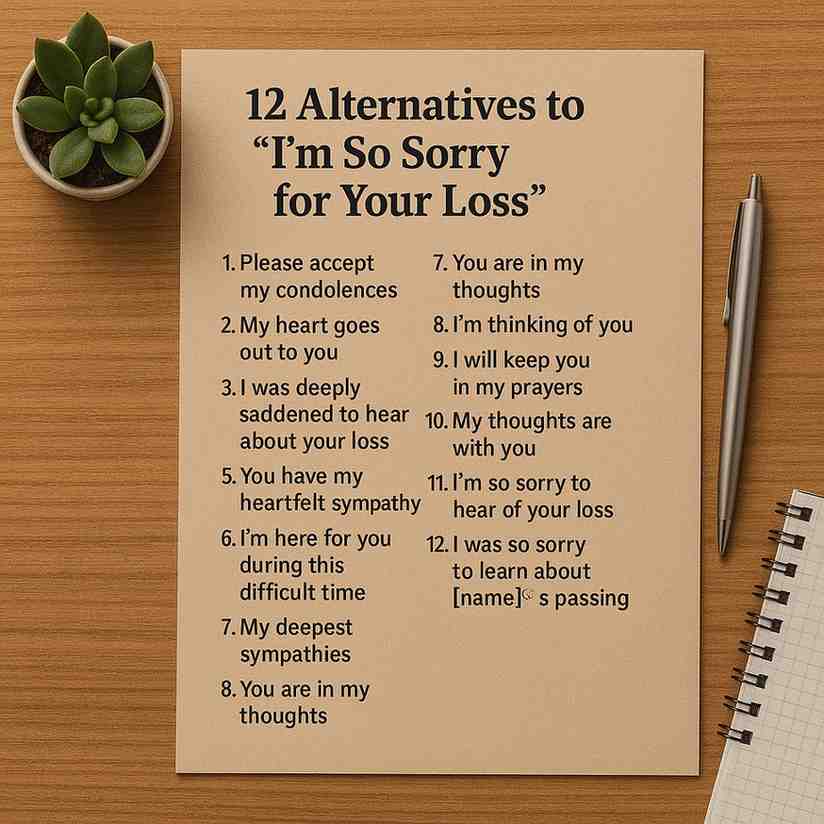“I’m So Sorry for Your Loss” – Meaning, Use, and Alternatives
Losing someone you care about is one of the hardest moments in life. When this happens to a friend, colleague, or family member, finding the right words can be difficult. You want to comfort them. You also don’t want to say something that feels empty or forced.
One of the most common phrases people use is “I’m so sorry for your loss.” It’s short and respectful. But it can also feel overused or too formal at times. In some situations, you might want a different way to express the same care and support.
This guide will explain what the phrase means, when it’s best to use it, and what to say instead. You’ll also see examples of how to respond if someone says it to you.
What Does “I’m So Sorry for Your Loss” Mean?
The phrase is a simple way to express sympathy after someone has died. It acknowledges that the other person is grieving. It also lets them know you care.
It’s not meant to fix the pain. It’s not meant to start a long conversation. Instead, it’s a short statement of compassion.
When you say this, you’re telling the person that you see their pain and share in their sorrow, even if you didn’t know the person who passed away.
When and Where to Use “I’m So Sorry for Your Loss”
You can use this phrase in many settings:
- Funerals or memorial services – When you meet the grieving person in person.
- Condolence cards – To express sympathy in writing.
- Emails or texts – If you can’t be there in person.
- Phone calls – As part of a longer message of support.
It works in formal and informal settings. You can say it to friends, coworkers, or distant relatives. It’s also acceptable when you don’t know what else to say but want to offer comfort.
However, some people may hear it so often that it feels less personal. That’s why knowing alternative phrases can help you sound more genuine.

Interesting Read – 25 Alternatives to “Looking Forward to Meeting You”
20 Alternatives to “I’m So Sorry for Your Loss”
1. “My heart goes out to you.”
Meaning: I feel deep sympathy for what you’re going through.
Explanation: This phrase shows emotional connection and empathy.
Scenario Example: “My heart goes out to you during this painful time.”
Tone: Warm and personal.
2. “You’re in my thoughts.”
Meaning: I’m thinking about you in your time of grief.
Explanation: Works well in writing or when you can’t be present in person.
Scenario Example: “You’re in my thoughts, and I hope you find peace soon.”
Tone: Gentle and caring.
3. “Thinking of you and your family.”
Meaning: I care about you and the people close to you.
Explanation: Expands sympathy to include loved ones.
Scenario Example: “Thinking of you and your family during this difficult week.”
Tone: Warm and inclusive.
4. “Wishing you comfort.”
Meaning: I hope you find some relief from the pain.
Explanation: Keeps the focus on healing and support.
Scenario Example: “Wishing you comfort as you remember the happy times.”
Tone: Soft and hopeful.
5. “I’m here for you.”
Meaning: I’m available to support you in any way.
Explanation: Best for close friends or family. Shows readiness to help.
Scenario Example: “I’m here for you—call me anytime.”
Tone: Casual and heartfelt.
6. “Please accept my condolences.”
Meaning: A formal way to offer sympathy.
Explanation: Suitable for professional or distant relationships.
Scenario Example: “Please accept my condolences for the passing of your father.”
Tone: Formal and respectful.
7. “You have my deepest sympathy.”
Meaning: My sympathy for you is sincere and strong.
Explanation: Adds emphasis while staying formal.
Scenario Example: “You have my deepest sympathy during this time.”
Tone: Formal but compassionate.
8. “I’m keeping you in my prayers.”
Meaning: I’m praying for you and your loved ones.
Explanation: Best used when you know the person values prayer.
Scenario Example: “I’m keeping you in my prayers and hoping for your healing.”
Tone: Spiritual and warm.
9. “May you find peace.”
Meaning: I hope you feel calm and healing soon.
Explanation: Simple and comforting for all beliefs.
Scenario Example: “May you find peace as you remember your loved one.”
Tone: Gentle and reflective.
10. “I’m sending you love.”
Meaning: I’m sending emotional warmth to you.
Explanation: Very personal and heartfelt.
Scenario Example: “I’m sending you love and wishing you strength.”
Tone: Intimate and caring.
11. “I wish I could be there with you.”
Meaning: I want to support you in person.
Explanation: Good when distance keeps you apart.
Scenario Example: “I wish I could be there with you to give you a hug.”
Tone: Warm and regretful.
12. “You’re not alone.”
Meaning: I’m here and others are too.
Explanation: Helps remind the person they have support.
Scenario Example: “You’re not alone—we’re all here for you.”
Tone: Reassuring and friendly.
13. “Your loss is felt by many.”
Meaning: Others also grieve with you.
Explanation: Works well in community or group settings.
Scenario Example: “Your loss is felt by many of us here.”
Tone: Supportive and collective.
14. “We’re grieving with you.”
Meaning: I share in your sorrow.
Explanation: Makes grief feel less isolating.
Scenario Example: “We’re grieving with you and remembering her together.”
Tone: Inclusive and empathetic.
15. “Take all the time you need.”
Meaning: Don’t rush your grieving process.
Explanation: Encourages patience and self-care.
Scenario Example: “Take all the time you need—we’ll handle things here.”
Tone: Supportive and patient.
16. “I can’t imagine what you’re going through.”
Meaning: I can’t fully understand, but I care.
Explanation: Admits your limits while showing empathy.
Scenario Example: “I can’t imagine what you’re going through, but I’m here to listen.”
Tone: Honest and caring.
17. “I’m so sorry you’re hurting.”
Meaning: I see your pain and feel sorry for it.
Explanation: Addresses the emotional state directly.
Scenario Example: “I’m so sorry you’re hurting right now.”
Tone: Personal and compassionate.
18. “Your loved one will be missed.”
Meaning: They made an impact that won’t be forgotten.
Explanation: Acknowledges the value of the person’s life.
Scenario Example: “Your loved one will be missed by everyone who knew him.”
Tone: Respectful and kind.
19. “We’re here if you need anything.”
Meaning: You can ask for help anytime.
Explanation: Offers practical and emotional support.
Scenario Example: “We’re here if you need anything at all.”
Tone: Friendly and open.
20. “I’ll be thinking of the good times we shared.”
Meaning: I’m remembering happy moments with the person.
Explanation: Shifts focus to positive memories.
Scenario Example: “I’ll be thinking of the good times we shared with her.”
Tone: Warm and nostalgic.
How to Respond When Someone Says “I’m So Sorry for Your Loss”
It can be hard to know what to say when you’re grieving. Often, a simple reply is best. You don’t have to give a long explanation of how you feel.
Common responses include:
- “Thank you.”
- “I appreciate your kindness.”
- “That means a lot to me.”
- “Thank you for being here.”
- “Your support means more than you know.”
If you feel comfortable, you can share a short memory or mention how you’re coping. But you’re not required to share details. People offering condolences understand that grief can leave you without words.
Conclusion
“I’m so sorry for your loss” remains one of the most common ways to offer sympathy. It’s short, respectful, and clear. But sometimes, you might want words that feel more personal.
By choosing the right phrase for the situation, you show the grieving person that your words come from the heart. Whether you use a formal condolence or a warm, personal message, the most important thing is that your tone is sincere.
When in doubt, keep it simple and kind. Often, it’s not about the exact words—it’s about showing up, listening, and letting them know they’re not alone.







